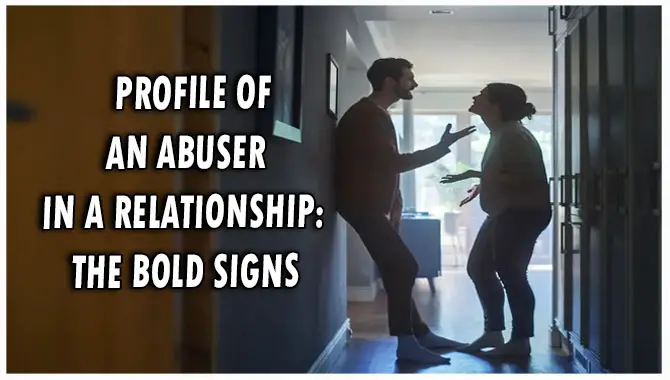Many people in relationships don’t realize that they’re in an abusive one until it’s too late. That’s why it’s important to be familiar with the profile of an abuser in a relationship, so you can spot it before it gets too bad.
This blog post will highlight the nine bold signs to help you identify if you’re in a relationship with an abuser. These signs are in mind if your partner exhibits any of them, and try to get out as soon as possible.

How Do You Know When You’re In An Abusive Relationship?

Different signs may indicate you’re in an abusive relationship. Still, some of the most common include: feeling isolated from friends and family, low self-esteem, increased anxiety or depression, escaping to avoid interactions with your partner, and feelings of chronic stress or helplessness.
If any of these symptoms persist for more than a few weeks, it is important to seek help. Abusive relationships can be extremely damaging both physically and emotionally. If you are ever in danger or feel like you cannot escape your situation, please reach out for help. Many resources are available, including helplines operated by shelters and support groups operated by professionals who specialize in helping victims of abuse.
Some warning signs that may suggest you’re in an abusive relationship include: feeling like you can’t escape the relationship; feeling like your partner controls everything in your life; feeling like you have no control over your feelings or thoughts; being afraid of or ashamed of your partner; constantly fearing for your safety; being isolated from friends and family.
9 Sign To Identify The Profile Of An Abuser In A Relationship

If you’re in a relationship with an abuser, it’s important to know the signs. Abusers often have a history of abuse and neglect and treat their partners like objects. They use them for physical and emotional gratification without regard for other people’s feelings or needs. Abusive partners are usually selfish and self-centered, with little respect for authority or boundaries.
They also tend to be angry, which can make things tough for their partners. Abusive relationships are usually unstable and destructive, with profound changes in both partners’ lives over time. If you’re looking for an escape, it’s important to remember that abuse is never the victim’s fault. So it’s important to know the 9 Bold Signs listed below.
Cognitive Biases: Rigid Psychology
Cognitive biases are mental shortcuts that we use to make decisions. They can influence our thoughts, feelings, and actions in some ways. They can harm our decisions and behavior, especially regarding relationships. Abuse victims tend to display certain cognitive biases that help abusers control them. These include rigid psychological beliefs and self-defeating thoughts.
Abusers also exploit these same cognitive traps to manipulate their victims into thinking they are responsible for the abuse: because abusers know how abusive tactics work, they can easily get victims convinced that it is their fault. If you notice any of these signs in your relationship, it is important to reach out for help as soon as possible – abuse doesn’t just affect one person; it’s an assault on both minds and bodies alike.
An Inability To Solve Problems

If you find yourself in a relationship with an abuser, it’s time to get out. Abusers are usually very good at hiding their true feelings, using charm, manipulation, and violence to try and get what they want. They often control the victim financially as well as emotionally. They lack empathy for others – making them prone to violent behavior. Their partner is usually the last thing on their mind – making them indifferent towards their partner’s wellbeing.
Low Self-Esteem

Low self-esteem is a common factor among abusers. This low self-worth often leads to abusers thinking they are superior to others and putting down partners. They may also insist on controlling their partner’s every move, make them feel inferior, or become jealous easily. If your relationship feels like it is full of any one or more of the above signs, it might be time for you to seek help from a professional.
Difficulty Communicating

Abusers in relationships have a difficult time communicating with their partners. This is because abusers often have a pattern of not listening to or understanding what their partners are saying. They may also react negatively to any attempts by the partner to talk about their feelings or request clarification.
As a result, it can be extremely difficult for the partner to express themselves freely. This makes it hard for them to get the information they need and build trust in the relationship. It can also make it difficult for them to develop healthy relationships with other people.
Emotional Dependence

Abusers in relationships often exhibit some of the following signs to control their partners:
- They tend to be emotionally dependent on their partners.
- They use emotional blackmail to get what they want.
- They constantly need reassurance that their partner is still interested in them.
- They make excuses for their abusive behavior, even when it’s obvious that they’re lying.
- They always put their partner’s needs before their own.
Need For Control
Abusers often have complete control over their partners and use whatever methods necessary to maintain that control. They may become possessive, jealous, and abusive to keep their partner under their thumb. Victims of abuse often feel like they have no say in their lives and are constantly on edge.
Abusers frequently make decisions unilaterally without consulting their partners – this can be very demanding for them as well as the victim. They also tend to set high standards for themselves, which the victim is expected to meet. Victims may feel like they are walking on eggshells or don’t know how things will end up. If you’re feeling scared or isolated, it’s important to reach out for help; many people care about you and want to help get you through this tough time.
Frustration

There seems to be something about being in a relationship that frustrates people to no end. No matter how hard you try, the abuser always manages to one-up you. They often have the last word in any argument and are very demanding. Additionally, they are often extremely possessive and make your life hell on earth. It can feel like all of your actions or words come back to haunt you later on – which is why frustration is such a common feeling in a relationship with an abuser.
No Self-Control Or Empathy

Abusers have very little empathy for their partners and no self-control. They often start arguments to gain control over their partner. Abusers are often possessive and jealous, thinking they own their partner completely. They lie frequently and distort the truth to take advantage of their partner. In some cases, abusers may isolate their partner from friends and family, knowing they will be more dependent on them.
Seductive Lies
Abusive relationships are characterized by a pattern of lies, manipulation, and emotional abuse. Abusers lie to control and manipulate their victims. They will often use seductive lies to draw their victims in before eventually hurting them.
Some of the most common seductive lies abusers use are:
- They’re not dangerous or abusive.
- They only have good intentions.
- They love you very much.
- You’re the only one they care about.
- You’re the only person who can make them happy.
Conclusion
The profile of a typical abuser is someone who uses their emotions and verbal skills for their gain. They are usually manipulative and cunning individuals who use physical violence as a way to assert power in the relationship. Their mindset is one of entitlement, jealousy, and possessiveness. If you are in a relationship with an abuser, you must get help as soon as possible. There are resources available to you – whether it’s counseling or support groups for victims of abuse – so please don’t hesitate to reach out for help.
Frequently Asked Questions:
What Is The Profile Of A Typical Abuser?
When it comes to understanding the profile of a typical abuser, several key points need to be kept in mind. First and foremost, abusers are usually manipulative and cunning individuals who use their emotions and verbal skills for their gain.
What Is The Behavior Of An Abuser?
Abusers exhibit a pattern of behaviors that control, hurt, and humiliate their partners. They are often emotionally abusive and use physical violence as a way to assert power in the relationship.
What Is The Mindset Of An Abuser?
Ab abuser’s mindset is one of entitlement, jealousy, and possessiveness. They see themselves as superior to their partners and believe that they are entitled to control them in all ways possible.
Why Do Abusers Hate Their Victims So Much?
Sadly, abusers hate their victims because they see them as a threat to their self-esteem and sense of power. They believe that by hurting and controlling their partners, they can ensure that the victim is always subordinated and dependent on them.
What Are Some Behaviors Of An Emotionally Abusive Partner?
Some behaviors of an emotionally abusive partner are accusing you of being disloyal, having affairs, and not being able to handle stress. They may constantly put their needs above yours, be verbally and emotionally abusive, and make you feel like a bad person.

I’m a writer and blogger who loves to talk about entertainment, culture, and relationships. I love to share my thoughts and insights on these topics, and I’m always looking for new ways to engage with my readers. I’m also a big fan of learning new things, so I’m always exploring new areas of interest.




